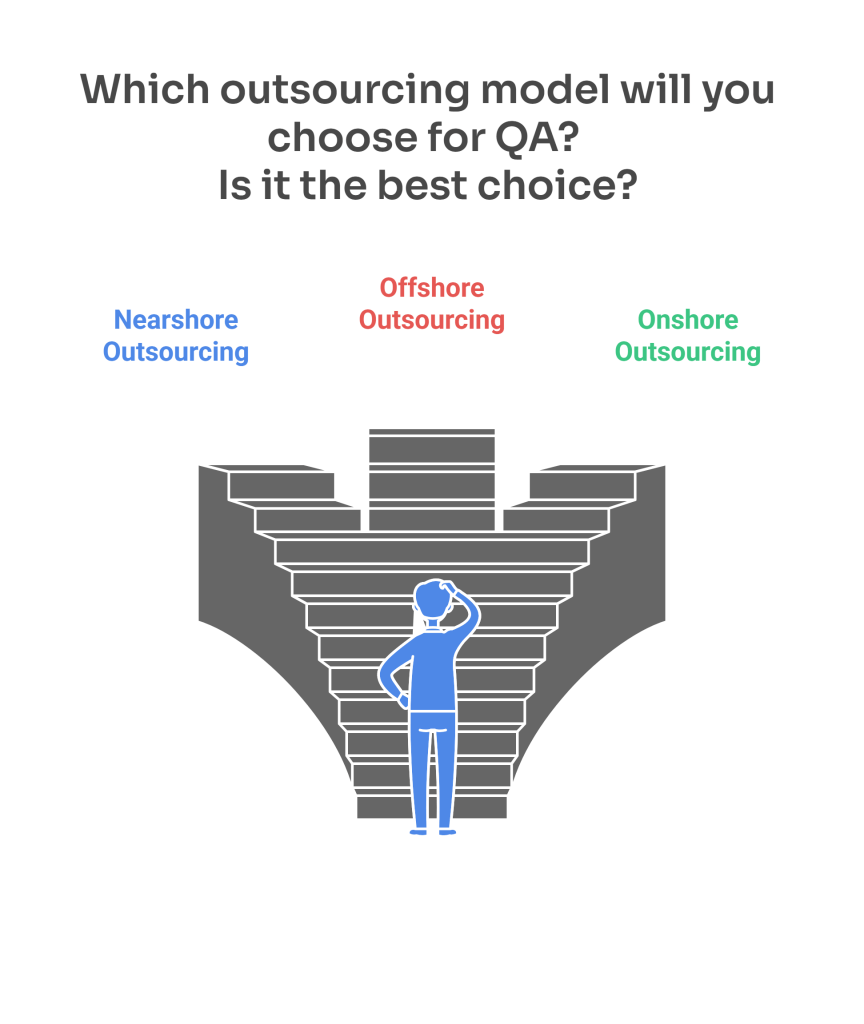Is Software Testing Outsourcing right for you? Find out in this guide! Learn the key steps to choose the right partner and boost software quality at scale.


What if your QA strategy could evolve today, without hiring more people or compromising quality? That’s the promise of software testing outsourcing when done right.
Far from being just a way to reduce costs, outsourcing QA can become a strategic lever to improve time-to-market, increase test coverage, and bring fresh, unbiased perspectives to your software. It helps development teams focus on what they do best, while specialized testers tackle quality with precision and care.
In this guide, we explore the full picture. You’ll learn how outsourcing works, when it makes sense, and how to choose the right partner to elevate your software testing practice. Ready to find the approach that fits your team and goals?
The right testing partner can change everything.
If you’re looking for a team that blends technical depth with real collaboration, you’re in the right place.
Explore what our clients say on Clutch and take a closer look at our innovative services.
Introducing Outsourced Software Testing


Outsourcing testing services can greatly assist in handling specialized tasks that may be too challenging or costly to manage internally. These services offer a wide range of advantages across various outsourcing modalities.
Let’s delve into what outsourcing software testing entails, its benefits and challenges, and key considerations for businesses seeking to leverage this approach effectively.
What is Software Testing Outsourcing?
It is the practice of partnering with an external team to carry out software testing activities.
This collaboration involves working with QA specialists outside your organization to execute specific testing tasks, processes, or entire testing cycles.
Outsourcing can take different forms—onshore, nearshore, or offshore—depending on the provider’s location. It typically includes functional testing, performance testing, test automation, usability testing, security testing, penetration testing, and other quality assurance services based on the project’s needs.
The external team may work independently or in close collaboration with your internal team, depending on the scope and agreements defined at the start of the engagement. By establishing shared workflows, timelines, and quality standards from the beginning, teams can move forward in sync and deliver meaningful results.
Benefits of Outsourcing Your Software Testing


Let’s debunk some myths about outsourcing software Testing by exploring its benefits and how it can enhance your software testing work.
- Shared Control and Clarity: Through a Service Level Agreement (SLA), both parties define roles, responsibilities, and expectations from the start. This allows you to stay involved in key decisions while the QA partner executes according to agreed standards and workflows.
- Protection of Intellectual Property: Professional outsourcing partners typically work under strict confidentiality agreements, such as NDAs, to help safeguard trade secrets and sensitive information. Just like with in-house teams, they contribute to business continuity by preserving knowledge across team changes or transitions.
- Scalability and Speed: QA needs change as products evolve. Outsourcing allows you to scale testing efforts efficiently, bringing in experienced professionals when needed, without the delays of internal hiring or onboarding.
- Specialized Expertise: External QA teams often bring experience across industries, tools, and testing methodologies. This helps identify risks early, apply the right techniques, and strengthen your overall QA strategy.
- Focus on Core Development: Delegating testing activities to a dedicated partner helps internal teams concentrate on product development and innovation, while quality is continuously validated by professionals focused solely on QA.
Still weighing outsourcing vs building an internal team? Explore our in-depth comparison on QA Outsourcing vs. In-House Teams to help you make the right decision for your context.
Types of Software Testing Outsourcing: Nearshore vs Onshore vs Offshore


Choosing the right outsourcing model starts with understanding your team’s collaboration style, context needs, time zone preferences, and available budget. Each model offers distinct strengths in terms of communication tools and flow, cultural compatibility, regulatory alignment, and flexibility.
The following comparison outlines key differences to help you find the best fit for your QA strategy.
| Criteria | Nearshore | Onshore | Offshore |
|---|---|---|---|
| Location | Nearby or neighboring countries | Same country | Distant regions, often across multiple time zones |
| Time Zone Overlap | Partial to full | Full | Limited |
| Language | High proficiency in common business languages (e.g., English) | Shared native language | Varies; may require language support |
| Cultural Compatibility | High; similar professional norms and communication styles | Very high | Varies; may require cultural alignment |
| Communication Flow | Real-time or near real-time | Real-time | Mostly asynchronous |
| Scalability | High (especially with regionally established partners) | Moderate (depends on local availability) | Varies |
| Regulatory Alignment | Often compatible or easily adaptable | Fully aligned with local frameworks | May require adjustment to meet compliance standards |
| Best For | Teams looking for a strategic balance between collaboration, adaptability, and shared context | Projects requiring strict legal, regulatory, or in-country operations | Initiatives with flexible time zone requirements and cost sensitivity |
Each outsourcing model brings its own context and considerations. To help you go beyond the comparison and better understand how each approach works in practice, let’s explore their key characteristics, collaborative dynamics, and common use cases in more detail.
Nearshore Outsourcing
Nearshore QA outsourcing refers to collaborating with teams in neighboring or nearby countries, often within overlapping time zones. This setup can simplify real-time communication and create stronger alignment across teams.
For example, teams based in the United States often work with QA partners in Latin America. Countries like Uruguay stand out for their cultural compatibility and business affinities, time zone alignment, established tech ecosystems, and English-speaking talent—key elements that support smooth collaboration.
You’re more likely to have greater ease of communication, cultural understanding, and real-time collaboration when you choose nearshore locations. This is particularly effective for agile workflows, where speed, iteration, and day-to-day collaboration matter.
On the downside, hiring nearshore software testers will likely cost more than hiring offshore. But the tradeoffs are worth the extra cost. Read more about this approach to outsourcing and learn how Uruguay poses an unlimited potential for software engineers and their US clients in this article.
Offshore Outsourcing
Offshore outsourcing involves working with QA teams located in geographically distant regions, often across several time zones. This model can be helpful for organizations aiming to expand their QA capacity with access to globally talented people.
The main advantage of offshore outsourcing is the cost efficiency. Rates for QA testers are much lower in Asia and Eastern Europe than in the Americas or Western Europe.
However, while cost savings are beneficial, there can be downsides such as language and communication barriers, cultural differences, lack of transparency, or time differences.
The offshore model may require adjustments in coordination, particularly when working asynchronously across time zones. Clear processes, shared documentation, and reliable communication channels are key to a successful partnership.
Onshore Outsourcing
This model involves partnering with a QA provider located in your own country. It offers the highest level of alignment in terms of language, culture, legal frameworks, and working hours. Communication tends to flow more naturally, which can speed up decision-making and reduce friction in daily collaboration.
On the downside, if they are only located in your own country, it may involve higher costs and limited scalability, depending on the local talented people. It’s often chosen for projects requiring strong regulatory alignment, strict security compliance, or highly synchronized workflows.
As you can see, among the different outsourcing models, nearshore stands out for its balance between collaboration, communication, and adaptability. But it’s not the right fit for every case. Choosing the right model depends on your priorities: how you work, what you’re building, and how you want your QA partner to collaborate with your team.
Understanding of Business Context


A key skill for any technology partner is understanding the business behind the software. Asking the right questions about the product, users, industry, and goals enables teams to co-create solutions that are relevant, sustainable, and aligned with strategic objectives. This applies not only to software testing but also to development and the implementation of AI-driven solutions.
Working with a partner who is familiar with your domain accelerates alignment and reduces the learning curve. From compliance in finance to usability in healthcare or performance in e-commerce, sector-specific knowledge helps anticipate risks, prioritize what matters, and adapt tools and processes to your unique context.
At Abstracta, we contribute meaningful expertise across industries, such as finance, healthcare, e-commerce, and tech, supporting teams with custom development, advanced testing strategies, and intelligent automation powered by AI and software agents.
Scalability for Small to Medium-Sized Organizations
While global enterprises are known to leverage outsourcing, there’s no reason why small to medium-sized organizations can’t do the same. Even if your budget allows only for one tester, outsourcing can provide access to a diverse team of experts in test automation, performance testing, mobile testing, and more.
As your product expands, it’s quicker to scale by adding testers to your outsourced QA team, who are already familiar with your product and the QA process, rather than hiring and onboarding new employees.
Click here to see how we support leaders across industries and book a meeting!
How to Choose the Right Outsourcing Company? Step-by-Step


Once you’ve decided to outsource, the next step is to clarify your needs before contacting software testing companies. Choosing the right partner involves both strategic thinking and practical evaluation.
Here’s how to approach it:
Step 1: Define What You’re Looking For
QA service providers offer versatility. Tailoring your engagement with a provider depends on your business context and specific requirements. Take time to define:
- The role you expect the provider to play: From consulting and strategizing to fully executing tests or supplementing your internal team.
- The expected duration: Is it a short-term collaboration or a long-term partnership?
- The engagement model: Do you need staff augmentation, or are you looking for a fully managed testing service?
- The services you need: Identify which types of testing or support will help you meet your goals, such as functional testing, test automation, performance testing, or test documentation.
Step 2: Shortlist Based on Fit
Once your needs are clear, begin researching potential partners who align with your priorities. Pay attention to:
- Company size
- Small to medium-sized providers tend to offer specialized services with close involvement from senior professionals.
- Larger firms may provide a broader service portfolio beyond QA, but can be less flexible and more layered in communication.
- Location
- Decide if you prefer nearshore, onshore, or offshore collaboration.
- Consider geographic and time zone proximity, especially if real-time collaboration is important to your team.
Step 3: Evaluate Cost and Capabilities
Cost is important, but it should be weighed alongside expertise and delivery quality.
- Hourly rates
- Location significantly influences rates. Companies in the US typically charge higher rates than those in South America, Europe, or Asia. But remember that the lowest rate may not indicate the lowest total cost.
- Expertise level
- Senior testers may have higher rates, but their efficiency, precision, and ability to guide the process can bring greater value overall.
Step 4: Assess Compatibility and Communication
Successful partnerships depend not only on technical fit, but also on how well you work together.
- Cultural compatibility
- Explore the provider’s values through their communication style, team dynamics, and presence online (website, social media, reviews).
- Consider how they treat their people, how they collaborate, and whether those practices resonate with your own culture.
- Communication fluency
- Determine the importance of clear and fluent language skills within your team.
- Think about how much real-time communication you need, and what level of response time is acceptable for your workflows.
Step 5: Validate the Fit Before You Commit
Now that you’ve identified potential QA partners, it’s time to refine your assessment. These final checks will help you select a provider that aligns closely with your goals, processes, and culture.
- Reputation: Look for client reviews and success stories. Explore platforms like Clutch.co or GoodFirms.co to find third-party testimonials and honest feedback.
- Testing Specialties and Domain Expertise: The risks, technologies, and timelines that software QA teams deal with vary greatly by business and industry. Check if the provider has worked with companies similar to yours, and whether they understand your product context.
- Technology and Toolbelt: Confirm their experience with your preferred tools. It’s unrealistic for a testing company to have experience working with each of the thousands of testing tools on the market. But keep in mind that it’s easy for a good tester to incorporate a new tool. What’s more valuable is the mindset they adopt and their testing approach.
- Cultural Compatibility and Values: Explore their communication style, team dynamics, and online presence. Consider how they treat their people, how they collaborate, and whether those values resonate with your own organization.
Want more guidance? Check out our full article on How to Choose a Software Testing Company, with valuable tips and strategies to make the best decision for your project.
Best Practices to Follow for Outsourced Software Testing


To achieve a successful partnership and fulfill your testing requirements, it’s essential to establish effective collaboration between both parties. Explore the best practices that promote synergy and drive positive results in outsourced testing efforts.
Establish a Point of Contact on Both Sides
When outsourcing software testing, it’s key to allocate time for addressing concerns and issues. A good practice is designating a main point of contact from both your development team and the outsourced testing company.
Creating an environment where anyone feels comfortable asking questions is essential for successful QA outsourcing. This encourages teams to raise concerns and seek clarification, fostering a collaborative and productive testing process.
Involve the Testing Team at the Beginning of Development
The sooner you involve the QA company, the quicker and easier they’ll be able to understand your product and what it is you’re trying to achieve in order to add value. It’s also a huge time and cost saver to start quality testing as soon as possible. For more insights on optimizing testing workflows, consider exploring this article on shift left and shift right testing.
Determine a Strategy and Project Goals at the Outset
Establish the testing strategy and expectations before starting to work on your project. Without a solid plan, you may come to some dead ends. Make sure all parties are aware of the plan and give testers all the necessary information, including the requirement specifications.
Wrapping Up: Putting It All Into Perspective


Given the various advantages of outsourcing software testing, many software engineers and QA experts have turned to outsourcing as a helpful solution to their business needs.
Make sure to consider all the benefits and challenges of outsourcing software testing. Make a list of criteria that satisfy your business goals when searching for the right testing company, and with enough careful review and assessments, you can find the best software testing company that suits your needs.
Remember the best practices once you’ve onboarded a new dedicated QA team. As with any internal team, it requires proper management in order to provide high-quality testing and the most value for your company.
FAQs – Software Testing Outsourcing


What Does The Software Testing Process Involve?
The software testing process involves defining testing objectives, building test planning, and executing across different operating systems using manual testing, automated testing, and quality assurance testing methods.
Is There Really A Testing Phase?
Many still consider it a phase within the software development life cycle. But it should be integrated from the beginning of the software development process to support thorough testing and continuous learning.
What Is Included In Comprehensive Software Testing?
It includes exploratory testing, automation testing, security testing, performance testing, accessibility testing, API testing, and so on. It fosters high-quality software products that adapt to your business goals.
What Are QA Testing Services In Outsourcing?
QA testing services in outsourcing combine strategic support, automation, and execution through a software testing provider who aligns with your team to deliver reliable software testing services.
How Do QA Testing Services Help In-House Teams?
QA testing services support in-house teams or an in-house QA team by adding test engineers and human testers, many times powered with AI Agents. This strengthens test coverage and avoids delays in demanding delivery cycles.
When Should You Involve An Outsourced Team?
An outsourced team can contribute at any point. Early involvement through a shift-left approach enables rigorous testing and promotes the efficient use of project management tools and internal resources.
What Are The Benefits Of Outsourcing QA Testing?
Outsourcing QA testing boosts flexibility, provides scalable talent, and improves software quality while supporting business development and keeping your internal team focused on what matters most.
How Does Outsourcing QA Testing Work In Practice?
Outsourcing QA testing means partnering with experts who bring experience, structure, and adaptability to your software testing services, helping you meet delivery goals without overextending internal teams.
What Should I Look For In A Software Testing Provider?
A reliable software testing provider understands your testing objectives, adapts to your software development process, and delivers services aligned with your expectations for qa testing and delivery.
How Does Onshore Testing Compare To Other Options?
Onshore testing offers strong alignment in language, regulations, and time zones. Nearshore models provide similar advantages, with added flexibility and cultural proximity. Offshore options are often more cost-effective, though they may require extra coordination across time zones and teams.
How We Can Help You


With over 16 years of experience and a global presence, Abstracta is a leading technology solutions company with offices in the United States, Chile, Colombia, and Uruguay. We specialize in software development, AI-driven innovations & copilots, and end-to-end software testing services.
We believe that actively bonding ties propels us further. That’s why we’ve forged robust partnerships with industry leaders like Microsoft, Datadog, Tricentis, Perforce, and Saucelabs, empowering us to incorporate cutting-edge technologies.
By helping organizations like BBVA, Santander, Bantotal, Shutterfly, EsSalud, Heartflow, GeneXus, CA Technologies, and Singularity University, we have created an agile partnership model. We deliver tailored solutions that bring together skilled teams, proven methodologies, and the right tools to drive real outcomes.
Our holistic approach enables us to support you across the entire software development life cycle.
What could your team achieve with the right QA partner by your side? Contact us to maximize the quality of both your web and mobile apps!


Follow us on Linkedin & X to be part of our community!
Recommended for You
Uruguay: The Best Hub for Software QA Engineers in Latin America?
QA Outsourcing vs In-House Team: What’s The Smarter Move?
What is Functional Testing? Types, Strategies, and Automation


Abstracta Team
Related Posts
A leader for each project, key for the creation of quality software
There are many companies that wish to avoid the costs involved in having a testing leader in their projects. In this article, Federico Toledo, Alejandra Viglietti, and Alejandro Berardinelli explain why this role is a priority for the creation of quality software and the economic…
Influential Latin American Women in Testing You Need to Know
Celebrating women who test from around the globe Since the Agile Testing Days blog published a list of 125 referential women in testing, and there were no Latin Americans included, I set out to lend a hand by collecting information on influential Latin American women…
Search
Contents
Categories
- Acceptance testing
- Accessibility Testing
- AI
- API Testing
- Development
- DevOps
- Fintech
- Functional Software Testing
- Healthtech
- Mobile Testing
- Observability Testing
- Partners
- Performance Testing
- Press
- Security Testing
- Software Quality
- Software Testing
- Test Automation
- Testing Strategy
- Testing Tools
- Work Culture





